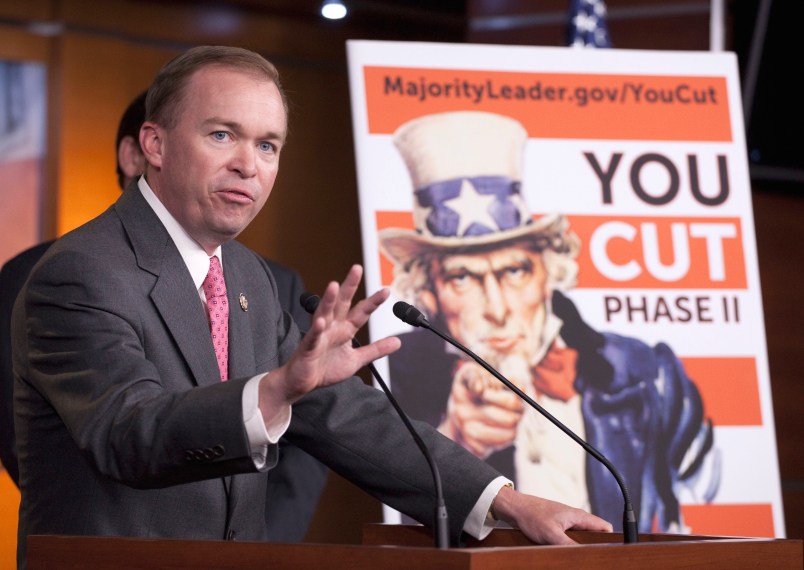Rep. Mick Mulvaney (R-SC), President-elect Donald Trump’s pick to direct the Office of Management and Budget, has been an ardent supporter of budget proposals that would privatize Medicare and has made overhauling the program a key issue in his approach to governance.
“We have to end Medicare as we know it,” Mulvaney said in 2011.
A Tea Party budget hawk who led the opposition to many of the funding compromises during the Obama era, Mulvaney vocally championed proposals by then-Budget Committee Chair Paul Ryan (R-WI) and others to privatize Medicare or impose other major changes to the program. He relentlessly argued that cutting retirement programs like Medicare was the only way to “balance the budget,” the Tea Party call to arms. He hasn’t been shy about calling for a drastic refashioning of Medicare.
“Medicare as it exists today is finished,” Mulvaney said at a townhall in 2011.
As OMB director, Mulvaney would have major sway within a Trump administration, and would play a key role in determining the administration’s position on mandatory programs like Medicare and Social Security, which Mulvaney once called a “Ponzi scheme.” The post requires confirmation by the Senate.
“The OMB director is one of the three most senior economic advisers to the President. In that role as an advisor to the president, he or she has a huge influence on all policy matters,” said Ken Baer, a former associate director at OMB in the Obama administration. “OMB director also has a huge influence over Medicare policy. Next to the [Centers for Medicare & Medicaid Services] administrator, who actually administers the program, and along with [Health and Humans Services] Secretary, OMB director is equally important.”
Soon after Mulvaney was elected to Congress in 2010, he became a major cheerleader for Ryan’s “Path to Prosperity” budget plan, which would have phased out Medicare by giving participants vouchers to use on marketplaces where insurers would compete to offer private plans.
Responding to President Obama’s claims that the plan would “end Medicare as we know it.” Mulvaney agreed with the assessment, but argued that it was necessary “because the Medicare that we know it is broke in about nine years anyway. “
“We have to end Medicare as we know it. We have to fix it,” he said, while pushing back on the use of the term “voucher.” (Conservatives prefer to call their system “premium support.”)
Mulvaney wore his vote for the plan as a badge of honor.
“There was a group of Republicans in the House of Representatives who voted to dramatically overhaul Medicare and Medicaid and lightning did not strike us,” he said after a 2011 vote for Ryan’s plan. “If that is not a sign that maybe things can be different around here, I don’t know what is.”
He took this message with him to town halls, where he told constituents that he favored means-testing for Medicare and Social Security, while arguing that “we will never, ever balance the budget until we change entitlements.”
“You have to raise the retirement age, lower a pay-out, change the reimbursement system. You simply cannot leave it the way that it is,” he told Bloomberg News in 2011.
As the fights over budgets and the so-called grand bargain on fiscal matters escalated in the ensuing years, Mulvaney also became one of the loudest members in the House’s far-right wing who had no problem toying with not raising the debt ceiling — and risking financial chaos — if they didn’t get the spending cuts they wanted. He also put himself to the right of even Paul Ryan by the time Ryan introduced the 2013 version of his fiscal blueprint, which still included a major overhaul to how Medicare was administered.
“We’ve changed,” Mulvaney said to explain his and other members’ dissatisfaction with the bill. He and other hardliners in the House voted against the major budget deals that were painstakingly put together by then-Speaker John Boehner, in part because the conservatives said the compromises didn’t go far enough in cutting programs like Medicare.
“You can’t cut the discretionary spending,” Mulvaney said in 2013. “You can’t do this forever based on discretionary spending. You’re going to have to get to entitlements.”
Trump’s selection for OMB director comes as other budget hawks, including Ryan and Rep. Tom Price (R-GA), who Trump has tapped to head the Department of Health and Human Services, have said they intend to move forward with plans to overhaul Medicare. Republicans in the Senate so far have appeared reluctant to take on efforts to privatize Medicare. The Trump transition team did not respond to TPM’s inquiry as to what Trump’s pick of Mulvaney meant for his plans on Medicare.
Not too long ago, Trump mocked GOP politicians for making cutting Medicare and Social Security their raison d’etre.
“Every Republican wants to do a big number on Social Security, they want to do it on Medicare, they want to do it on Medicaid,” Trump said on campaign trail in April. “And we can’t do that. And it’s not fair to the people that have been paying in for years and now all of the sudden they want to be cut.”










